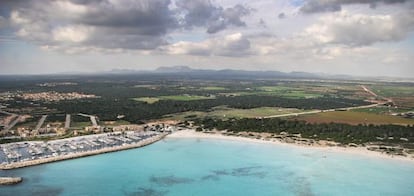Mallorca's dilemma: protect its pristine beaches or create jobs
Proposed luxury hotel complex in unspoiled area outrages environmentalists The regional government has declared the project of "special interest" The beach is one of the most popular on the island for visitors

One of Mallorca's last remaining undeveloped beaches, Es Trenc, in the southeast of the island, is under threat from a proposed hotel and golf complex that has the backing of the regional government of the Balearics.
Last week the islands' Popular Party (PP) administration announced that it was supporting a proposal to build a 120-million-euro, 1,250-bed luxury hotel, along with a golf course and other facilities on a 20-hectare site in the sleepy village of Sa Ràpita. The plan, they said, will supposedly create up to 300 jobs.
The proposed site, on a former dairy farm, is just 150 meters from one of Europe's most spectacular beaches. Es Trenc has withstood efforts in the past to build on it thanks to local pressure groups, who cite regional and national laws that are designed to protect Spain's coastlines.
This time, the regional government, headed by José Ramón Bauzá, has declared the project of "special interest to the region," thereby cutting the time required to apply for permits and to hear objections. One of the first things that the regional government did when it took over from the Socialist Party in May 2011 was to throw out measures allowing local people and environmentalists to veto building projects. As well as controlling the regional government, the PP also runs the Sa Ràpita town hall.
Bauzá has said that his priority is to attract investment to the Balearics at a time of worsening unemployment and when the regional government's coffers are empty. He has promised "transparency and legal guarantees" in carrying out the project.
Under his mandate, the regional government has already given the go-ahead for four other large-scale hotel projects on the island, at Capdepera, Calviá, Magaluf and Canyamel. The last two, like Es Trenc, are in protected areas. More than two dozen housing complexes that had been put on hold have since been reactivated by Bauzá's administration. Around one hundred construction projects that had been declared illegal have now been given the go-ahead.
Es Trenc is a four-kilometer stretch of unspoiled coastline, with dunes, wetlands and salt flats, and is a stopping-off point for migrating birds. Off the coast lies the protected nature reserve of Cabrera. In 1977, local people succeeded in preventing the construction of a complex of holiday homes, and six years later, when the autonomous region of the Balearics was created, it was included under legislation aimed at protecting the islands' environment.
Es Trenc and its beach are one of the few reminders of what Spain's Mediterranean coastline was once like, before the country became Europe's preferred beach-holiday destination. Mallorca continues to use the beach to advertise its charms, projecting an image of sustainable tourism. The beach is one of the most popular on the island for visitors, who arrive by boat and car.
Environmental groups, nationalist parties, and the Socialist Party have begun an awareness campaign to try to overturn the regional government's decision to back the hotel project, describing the proposals as "destroying the island's land on an unprecedented scale," and an "attack on the wishes of the public." Rafael Bosch, the PP's spokesman on the island, told journalists at a press conference last week that the impact of the proposed hotel would be "minimal."
Bosch insisted that environmental legislation would be respected, and repeated that the project had the backing of the town council. "The project is a legitimate activity that will generate jobs, and has nothing to do with politics," he said. The four companies behind the new complex, aware of the likely reaction of local people - more than 17,000 signatures have been collected - had been looking for financial backing from companies outside Spain that have been involved in sustainable tourism projects.
The PP has long campaigned in favor of what it sees as Es Trenc's need to make better use of its natural resources. Bauzá says that he wants the private sector to "play a major role in improving the quality of Mallorca's tourism infrastructure, and to take over the role of driving economic growth."
More than 27.7 percent of Spain's territory is protected from being built on by law, one of the highest percentages in the EU. "Coastal regions represent just seven percent of land, but are home to 44 percent of the population," a BBC report reads. "In some communities, three-quarters of all land adjoining the coast has been built on."
The country's Environment Ministry has also estimated that Spain's beaches will shrink by an average of 15 meters by the middle of the century due to rising sea levels, making the coasts an even more precious resource.
At the height of the construction boom, in the early 2000s, Greenpeace issued a report saying that Spain was destroying an area of her coastline equivalent to eight soccer pitches every day.
Tu suscripción se está usando en otro dispositivo
¿Quieres añadir otro usuario a tu suscripción?
Si continúas leyendo en este dispositivo, no se podrá leer en el otro.
FlechaTu suscripción se está usando en otro dispositivo y solo puedes acceder a EL PAÍS desde un dispositivo a la vez.
Si quieres compartir tu cuenta, cambia tu suscripción a la modalidad Premium, así podrás añadir otro usuario. Cada uno accederá con su propia cuenta de email, lo que os permitirá personalizar vuestra experiencia en EL PAÍS.
En el caso de no saber quién está usando tu cuenta, te recomendamos cambiar tu contraseña aquí.
Si decides continuar compartiendo tu cuenta, este mensaje se mostrará en tu dispositivo y en el de la otra persona que está usando tu cuenta de forma indefinida, afectando a tu experiencia de lectura. Puedes consultar aquí los términos y condiciones de la suscripción digital.







































